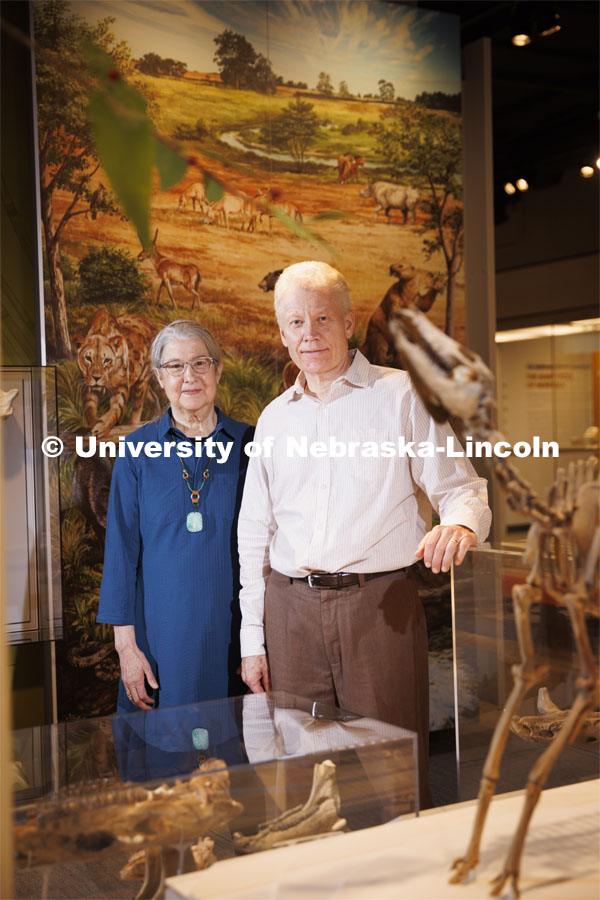
Title:
220912 Diamond Secord 032 (permalink)
Order Instructions:
To order this photo, send Craig Chandler an email and include the text '220912 Diamond Secord 032'.
Caption:
Nebraska paleontologist Ross Secord and Judy Diamond pose next to a Mesohippus skeleton. The two are working together at Looking Back for Future Climate Clues. With a nearly $350,000 grant from the National Science Foundation, Secord’s pursuing a first-of-its-kind study that explores how climate change affected the environment, ecosystems and organisms during the Early Eocene Climatic Optimum. The EECO took place about 52 million years ago and was the warmest interval of the past 70 million years.
Marked by a shift to high carbon dioxide levels, warm temperatures and increased precipitation, the transition from pre-EECO to the EECO is considered a good analogue for future climate change. Better understanding ecological changes during this time may provide clues to scientists trying to forecast future conditions.
“Studying intervals in the geologic record where the global warming experiment has already occurred gives you a way of figuring out what the possible outcomes of climate change may be,” said Secord, associate professor of earth and atmospheric sciences.
Secord and collaborators are analyzing fossil records from Wyoming’s Bighorn and Wind River basins, which have rich collections from the EECO. They will identify the types of forest structure that prevailed during that period. Their findings will clarify the interrelationship between climate change, forest structure and mammal evolution.
Secord will analyze fossil teeth of EECO mammals to infer the types of habitats present in the environment. Mammalian tooth enamel preserves the different types of carbon found in the plants they consumed. This process is part of stable isotope geochemistry, one of Secord’s specialties.
Nebraska’s Judy Diamond is leading an outreach plan that provides 50 rural and tribal libraries in Nebraska and across the nation with current information about climate change, water resources, mammal evolution a
Marked by a shift to high carbon dioxide levels, warm temperatures and increased precipitation, the transition from pre-EECO to the EECO is considered a good analogue for future climate change. Better understanding ecological changes during this time may provide clues to scientists trying to forecast future conditions.
“Studying intervals in the geologic record where the global warming experiment has already occurred gives you a way of figuring out what the possible outcomes of climate change may be,” said Secord, associate professor of earth and atmospheric sciences.
Secord and collaborators are analyzing fossil records from Wyoming’s Bighorn and Wind River basins, which have rich collections from the EECO. They will identify the types of forest structure that prevailed during that period. Their findings will clarify the interrelationship between climate change, forest structure and mammal evolution.
Secord will analyze fossil teeth of EECO mammals to infer the types of habitats present in the environment. Mammalian tooth enamel preserves the different types of carbon found in the plants they consumed. This process is part of stable isotope geochemistry, one of Secord’s specialties.
Nebraska’s Judy Diamond is leading an outreach plan that provides 50 rural and tribal libraries in Nebraska and across the nation with current information about climate change, water resources, mammal evolution a
Copyright:
© 2022, The Board of Regents of the University of Nebraska. All rights reserved.